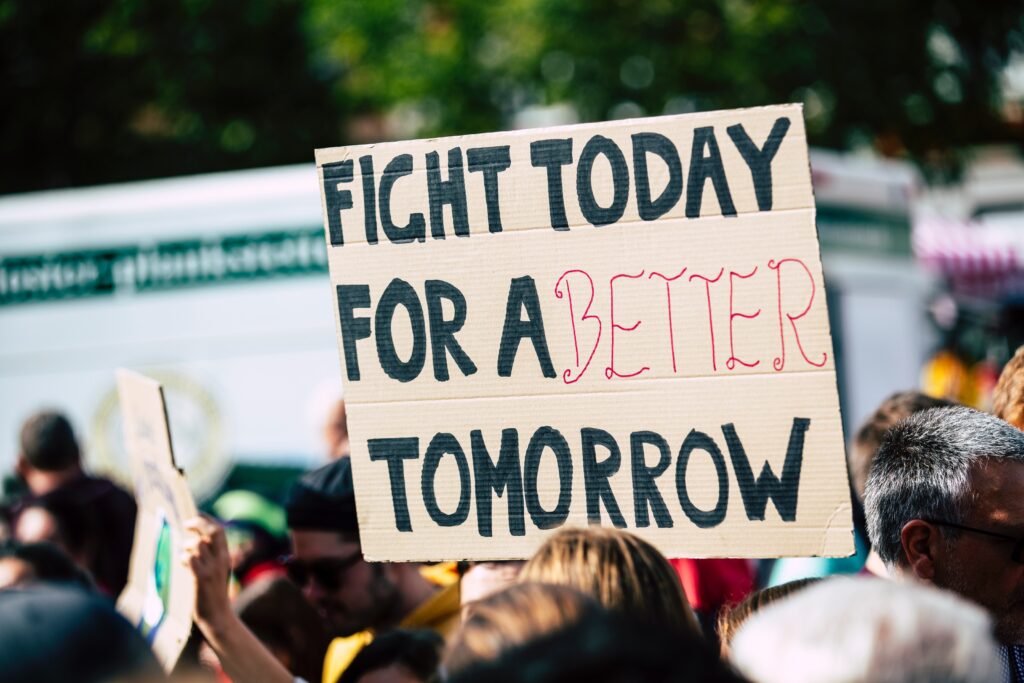Voices from Youth: Climate Action for Sustainable Development Goal 13!
There’s been a global wave of youth activism in addressing the urgent challenges of the climate crisis in recent years. Inspired by the actions of Greta Thunberg, young people around the world are uniting together to demand action from governments, organizations, and individuals to combat the threats posed by the impacts of climate change. At the heart of this global movement lies SDG 13 Climate Action, which aims to mobilize efforts to combat climate change and its impacts. This goal also emphasizes the critical role that young people play in shaping the future and the need for their active participation in addressing the climate crisis.
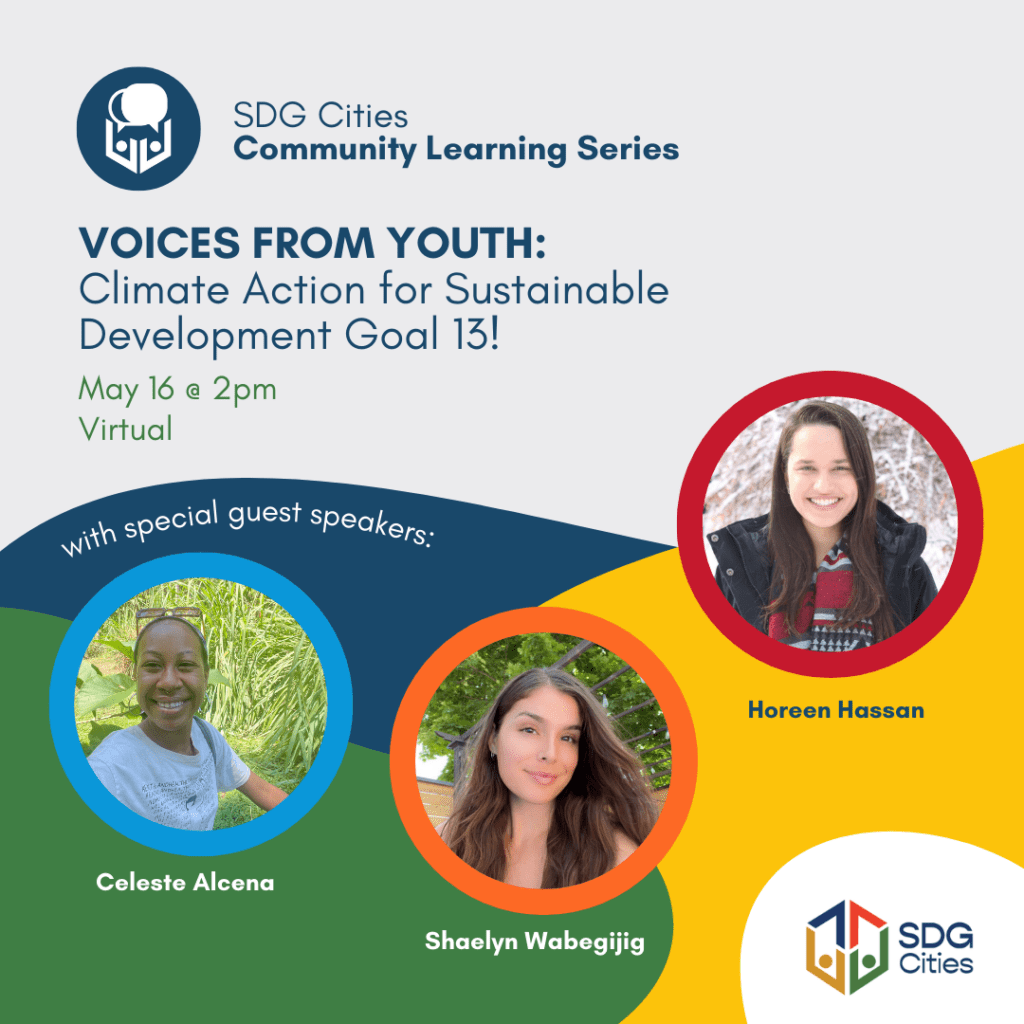
On May 16th, 2023, SDG Cities hosted a Community Learning Series on how young people across Canada are taking urgent action to address the climate crisis. Participants gained valuable insights into diverse approaches, personal experiences and perspectives on tackling the issue of climate change as well as empowering others to take action. We were joined by three amazing and inspiring panelists:
- Celeste Alcena is a community organizer, facilitator, and multi-disciplinary creative
- Shaelyn Wabegijig, one of seven young people from across Canada who are suing the Ontario government for climate inaction
- Horeen Hassan, a Campaign Organizer from Wellington Water Watchers.
You can find the recording of the event here.
Climate Action is Every Day
Celeste began her presentation with a grounding exercise, encouraging participants to connect with the Earth by taking a moment to observe their surroundings and feel the contact of space, air, and sunlight. She emphasizes the notion of climate action being an everyday practice, encompassing simple actions, such as how we drink water and our relationships with each other. She highlights the importance of our relationships with the land, community, and oneself, emphasizing the collaborative nature of building a caring community and engaging with friends and family.
“Climate action is every day. It’s how we drink our water. How we are taking care of each. It’s our relationship with the land, community, and self. It’s the way we build our community together. How we interact with friends and family. It’s very simple! We are all doing it and we are all climate action people.”
–Celeste Alcena
Celeste shared her personal entry points to climate action. She recounted how a university class on environmental justice broadened her understanding beyond climate change itself. Her professor highlighted the reasons behind the changing systems and their impacts, prompting Celeste to reflect on the connection between climate change and ancestral knowledge, displacement, and intuitive feelings. Having recently visited her ancestral lands in the Bahamas, Celeste realized the significance of the land, its people, and culture. She also mentioned community building and youth engagement through activism and NGOs as important entry points to climate action. Additionally, spirituality played a crucial role for her, as it helped her discover her unique gifts, purpose, and role within the movement.
There are many entry points to climate action, including art-based approaches, policy and academia research, and community activation. Celeste concluded her presentation by encouraging participants to find causes and avenues that resonated with their own values and interests.
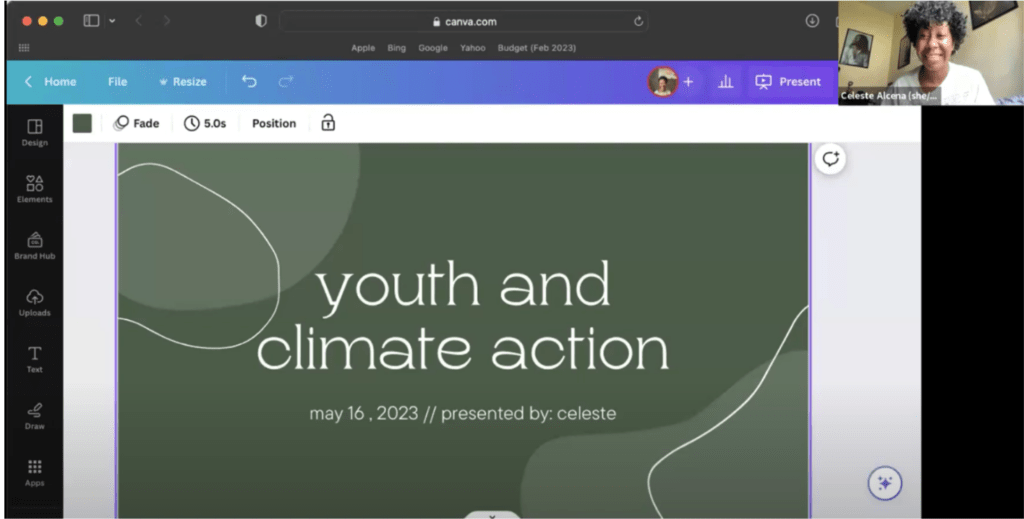
Indigenous Leadership is Climate Action
Shaelyn embarked on her career in sustainability back in 2017 and has since dedicated herself to working with various NGOs for the past five years. Through working with different projects, she successfully brought Indigenous Leadership to the forefront of the SDGs. She highlights that climate change disproportionately affects Indigenous communities, despite their minimal contributions to the global climate crisis. The removal of Indigenous peoples from their lands not only harms their communities but also deprives them of the ability to effectively respond to climate change.
“Indigenous peoples have a unique understanding of the Earth and its interconnectedness, acquired over thousands of years, making them uniquely positioned to anticipate, prepare for, and respond to the impacts of climate change. They play a crucial role in the development of climate resilience projects, drawing upon their deep knowledge of the environment that has emerged alongside their cultures and languages.”
–Shaelyn Wabegijig
In addition, Shaelyn is one of the seven young climate leaders supported by Ecojustice, Canada’s largest environmental law charity. They are currently engaged in legal action against the Ontario government, aiming to challenge the weakening of climate targets, which puts the lives, liberty, and security of Ontarians at risk. Shaelyn argues that Indigenous peoples and youth are especially vulnerable in the face of the Ontario government’s inadequate response to climate change. She hopes that this lawsuit will bring attention and prompt action towards addressing the climate crisis.
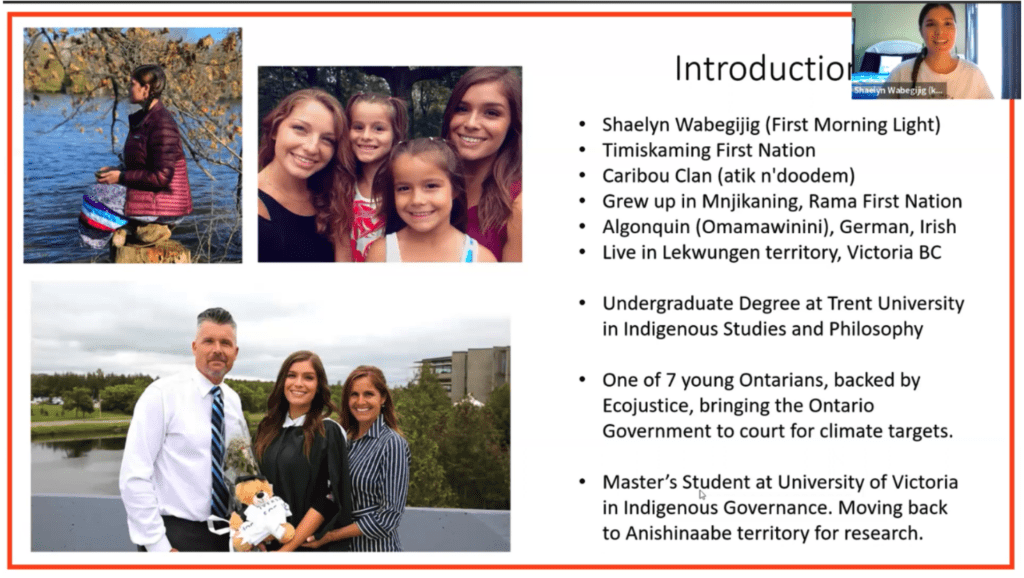
Youth Action on Climate Change
Horeen studied international Development at University of Guelph (U of G) to better understand power dynamics between the Global North and South. Motivated by her passion for climate justice, she actively participated in the Student Union’s climate justice movement. With a strong focus on intersectionality, Horeen witnessed numerous issues intersecting within the movement, including the profound impact of mental health and climate anxiety. Determined to transform her climate anxiety into purposeful action, she spearheaded successful campaigns and organized initiatives aimed at building a broader movement.
One notable campaign Horeen contributed to was the Fossil Free Guelph campaign, which persisted for seven years. Its objective was to urge the U of G to divest the $35 million it had invested in fossil fuels. Another impactful endeavor she participated in was the Tapin! Campaign, which advocated for the termination of the University’s contract with Naya, a bottled water provider, after it expires in 2022. Furthermore, Horeen played a role in the Decolonial Solidarity Campaign, which exposed the Royal Bank of Canada (RBC) for its funding involvement in the Coastal Gas Link Pipeline across Indigenous territories, resulting in reputational damage to the bank.
“The thing about activism is that it can be fun and the most successful campaigns are where everyone feels valued and important. A non hierarchical consensus model has been very successful at making everyone feel seen, safe and valued. A lot of great friendships have actually blossomed out of a lot of these campaigns.”
–Horeen Hassan
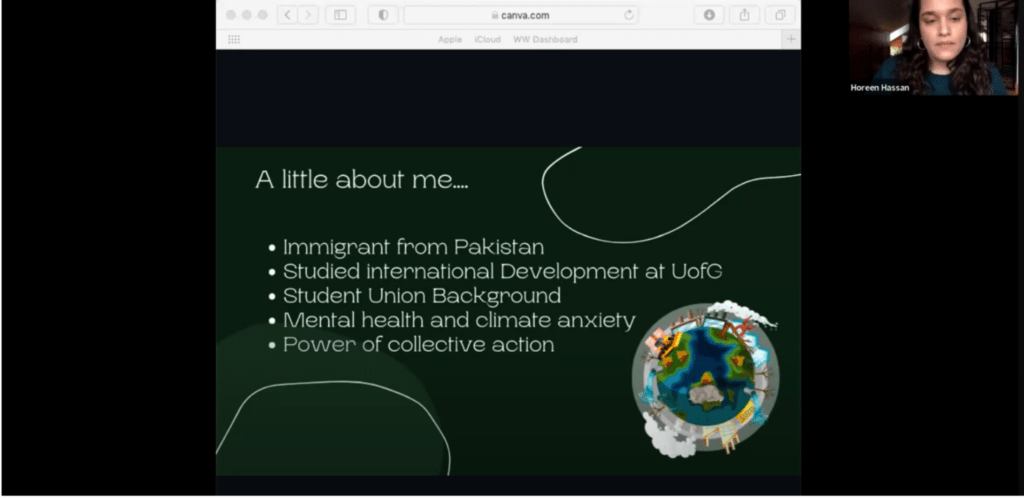
What’s Next?
Youth-led climate movements across Canada and around the world have proved to be a powerful force, motivating individuals, organizations and governments to take urgent action to reduce greenhouse gas emissions and protect citizens from the impacts of climate change. The collective voice of young people is instrumental in SDG 13 as the interconnected nature of the climate crisis requires collaboration, knowledge sharing and advocating for systemic change.
If you are looking to delve deeper into taking action against climate change, the panelists shared a compilation of valuable resources below that can help you get started!
- If you are interested in learning more and supporting the Ecojustice case on climate inaction, please read more here https://www.support.ecojustice.ca/page/91872/petition/1?ea.tracking.id=Website_TakeAction
- Check out OPIRG for environmental and social justice website for information on taking action – http://opirgguelph.org/
- Join Youth Climate Lab’s movement across Canada to create just and resilient futures for us all – https://www.youthclimatelab.org/
- Learn about how Wellington Water Waters empowers people & communities to work in solidarity towards social justice through the unifying lens of water– https://www.wellingtonwaterwatchers.ca/
Panelists Biographies:
Celeste Alcena is a Canadian-Bahamian community organizer, facilitator, and multi-disciplinary creative currently based on unceded Algonquin territory (Ottawa, Canada). Celeste’s connection to climate work currently sits at the intersection of environmental justice and healing, passionate about nurturing spaces for wellness and embodiment within their communities, especially through re-connecting to the lands and waters close to us. They are a DJ and certified yoga/meditation guide and have been facilitating connection & healing work through music, movement, and intuitive ancestral medicines for over 3 years, believing deeply in the power of reclaiming traditional knowledge and practices that can support the co-liberation of ourselves in connection to Earth.
Shaelyn Wabegijig is Algonquin Anishinaabe, German and Irish. She is Caribou Clan, a member of Timiskaming First Nation and grew up in Rama First Nation. She moved to Peterborough Ontario and received her bachelor’s degree with a joint major in Indigenous Studies and Philosophy. She then worked for multiple non-profits for 5 years with a focus on educating the public on intersectional environmentalism. Most notably, she worked for the Kawartha World Issues Centre for two years, where she coordinated two projects to advance the SDGs in Peterborough. These community projects took an Indigenous leadership approach because they know sustainability on stolen Indigenous lands cannot be achieved without Indigenous leadership. She is currently living in Lekwungen territory in Victoria BC, and completed her first year of her master’s at the University of Victoria in Indigenous Governance.
Horeen Hassan joined the Water Watchers team in 2021 as the Guelph Campaign Organizer. She has a strong history in the student movement and has a deep connection to the justice movement in Guelph. Her time in the student movement allowed her to mobilize young people around environmental issues. Whether it was ending water bottling contracts, challenging plastic waste on campus, or pressuring her post-secondary institution to divest from fossil fuels, Horeen has always demanded better of those in positions of power. In 2021, Horeen walked over 100 kilometres visiting and interacting with communities whose drinking water is being threatened by gravel mining, developers, and other corporate interests. She has also been working to amplify the voices and work of those at Six Nations, and advocating that the Nestlé/Blue Triton bottling plant be returned to Six Nations.

